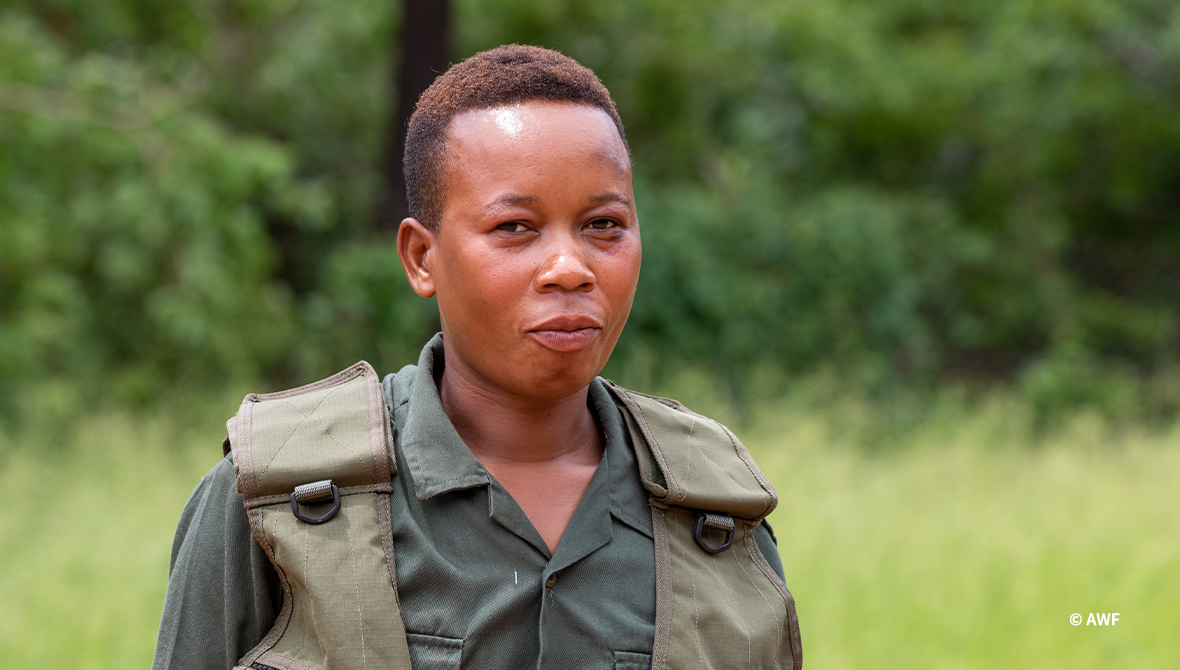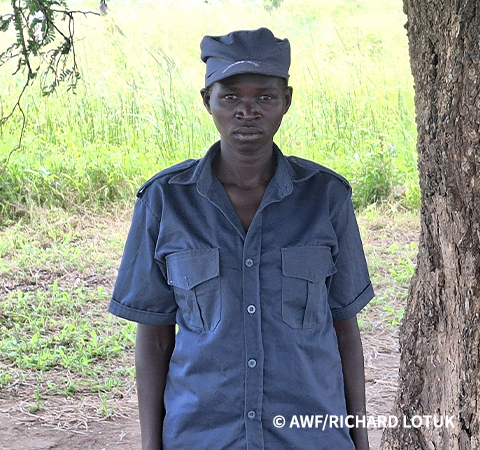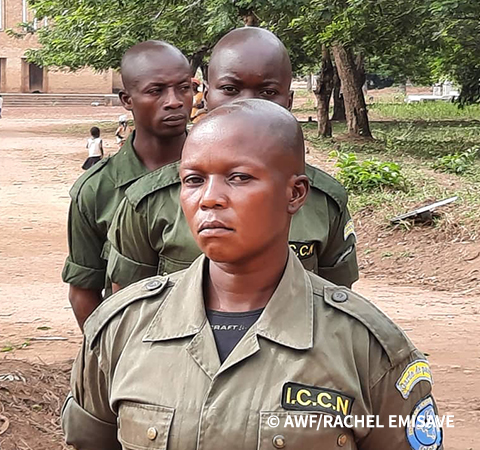World Female Ranger Week: AWF Celebrates Women on the Front Lines of Conservation

Edith John is a wildlife scout in Mbire District, Zimbabwe.
Rangers, wildlife scouts, and game wardens stand on the front lines protecting Africa’s breathtaking landscapes and iconic wildlife, which face constant threats. They act as a bridge between communities and protected areas and are often the first responders in cases of human-wildlife conflict (HWC).
Despite comprising less than 11% of rangers globally, women are making significant strides in conservation efforts. Women rangers and scouts, with their exceptional communication skills and profound understanding of their communities, are instrumental in building a sustainable future where wildlife and people coexist and thrive. The African Wildlife Foundation (AWF) recognizes and celebrates their invaluable contributions.
In celebration of World Female Ranger Week, we will be highlighting the diverse and impactful work of these women scouts across Zimbabwe, Uganda, DRC, and Kenya. AWF acknowledges the pivotal role that communities play in preserving Africa’s wildlife heritage. This celebration is a tribute to the women who are not just protecting wildlife but also shaping the future of conservation.

Evaline Anyam is a wildlife scout in Uganda.
Evaline Anyam: A Trailblazer in Conservation
In the heart of Kidepo Valley, within the rugged Lobalangit sub-county, Napeyok Evaline Anyam’s journey into conservation began with a profound desire to address the human-wildlife conflict (HWC) that plagued her community.
In 2015, Evaline and nine others answered the call from the Uganda Wildlife Authority (UWA) to assist rangers in protecting crops from wildlife, marking the start of a transformative journey for her and her community.
“When I joined in 2015, they questioned my resolve. ‘Can a woman spend a week in the bush?’” she reflects. Yet, her unwavering commitment silenced the doubters. “I now see people harvesting crops and benefiting from our efforts,” she says with pride.
The scouts’ swift responses to wildlife raids have saved many crops, directly enhancing livelihoods in the region.
The challenges faced by Evaline and her fellow scouts are immense. The UWA headquarters is 24 kilometers away, making rapid response difficult. The vast Kidepo landscape, spanning six districts, adds to the complexity.
The African Wildlife Foundation (AWF) has supported the scouts through training and providing essential equipment like electric horns and raincoats.
“We have received numerous trainings from AWF and are now very knowledgeable about wildlife behavior,” she notes. This knowledge has been vital for farmers implementing measures like growing chili around gardens to deter wildlife.
Evaline uses every opportunity to advocate for coexistence between humans and wildlife.
“My plea to women out there is that this is doable, and they should heed the plea of the older mothers who can’t do the same. Women in Karamoja are the backbone of society; they ensure families are fed, and so it is upon us to protect our yields,” she adds.

Marguerite Bilali Amayo is an ecogaurd in the DRC.
Marguerite Bilali Amayo: From Cleaning Lady to Ecoguard
The Bili-Uere hunting estate, a 32,748 km² Protected Area in Bas-Uélé province, Democratic Republic of Congo, has been co-managed by the Institut Congolais pour la Conservation de la Nature and African Wildlife Foundation since 2018. With the support of the European Union’s ECOFAC6 funding, AWF retired 40 older ecoguards and recruited 40 younger ones in 2022, including Marguerite Bilali Amayo and Isabelle Lakili, the only female recruits.
Marguerite, a married mother of four, transitioned from a cleaner at the ICCN offices to a first-class eco-guard, driven by her admiration for her female colleagues. “My motivation grew daily, watching Bijou and Marie on parade. In the sixth year, I decided to turn my dream into reality by applying,” she shares.
Marguerite’s biggest challenge is the time spent on patrols. “For a woman to go 10 or 15 days without taking a bath is not easy. When menstruating, I make sure to prepare and find ways to stay clean without holding up the troop,” she explains.
On her first mission to raise awareness about bushmeat, Marguerite found the local community more attentive. “I made them understand that I, too, need to feed my family, but not at the expense of humanity by promoting the extinction of protected species like chimpanzees,” she says.
Marguerite advises aspiring ecoguards to embrace hard work and dedication. “Being a paramilitary and a mother demands putting aside whims to assume your true worth and give your best. The eco-guard profession is compatible with family life,” she insists. “Africa needs more hearts beating for nature conservation. There’s room for courageous women determined to make history.”
Edith John: Mbire district in Zimbabwe
Edith John, a wildlife scout in Zimbabwe’s Mbire landscape, turned her passion for wildlife and her father’s legacy into a career. Her father was tragically killed by a lion in 2010, sparking her desire to protect her community’s natural resources.
Edith’s role extends beyond anti-poaching patrols. She records wildlife data, educates communities about human-wildlife conflict, and manages problem animals. Despite the male-dominated environment, she overcame her initial fear and now works diligently alongside her male counterparts.
“The work we are doing promotes peaceful co-existence between people and wildlife. Through awareness campaigns on animal behavior and protection methods like using chilli bricks and strings, we help communities, although it may not be a foolproof solution,” Edith explains.
In 2018, AWF encouraged women in Mbire to train as game scouts. Initially, the idea was met with hesitation, but eventually, five women, including Edith, began their training.
Edith’s work has significantly improved human-wildlife coexistence in Mbire. The ranger knowledge she gained has helped her address community problems effectively. She leads by example, recently fencing her goat kraal to protect it from wildlife.
AWF supports the scouts with uniforms, field equipment, and technology to record wildlife information. Edith’s work has empowered women in Mbire District, inspiring more than 20 women to become scouts.
From her allowances and personal savings, Edith bought a grain grinding mill and expanded her goat-rearing venture, providing financial stability and empowering her as an entrepreneur. “I am excited to have played my part in making life easier for women and community members by bringing the mill to their convenience,” she says.
This World Female Ranger Week, let's celebrate the achievements of these women and support organizations like AWF that empower women to protect their land and wildlife heritage.
>>Watch The Peacekeepers, a short film documenting Edith John's work.